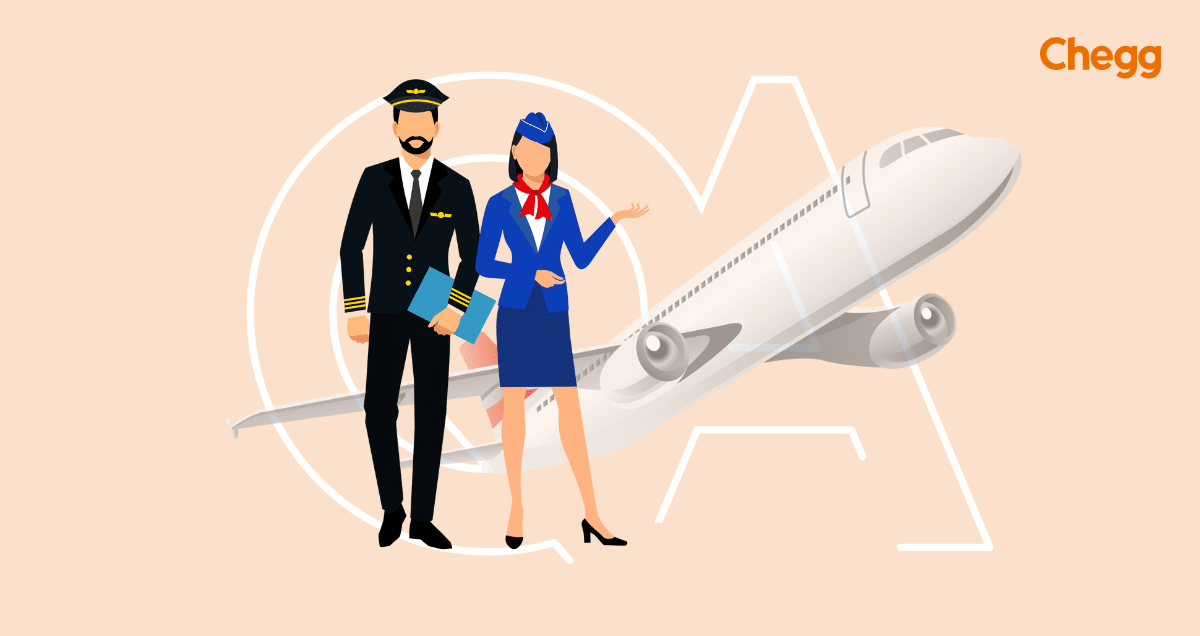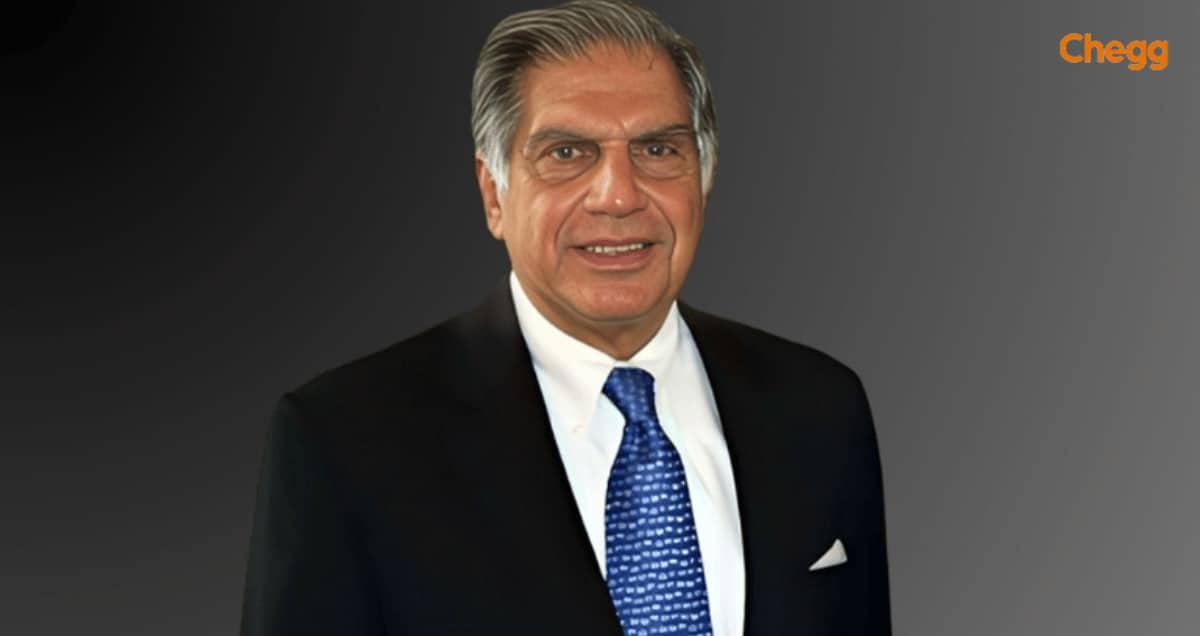Top 30 Cabin Crew Interview Questions & Expert Answers
Acing a cabin crew interview requires thorough preparation and an understanding of what interviewers are looking for. As a cabin crew member, you will play a vital role in ensuring passenger safety, providing exceptional customer service, and representing the airline’s brand professionally. Cabin crew members need many skills. They must be good at working with […] The post Top 30 Cabin Crew Interview Questions & Expert Answers appeared first on Chegg India.

Acing a cabin crew interview requires thorough preparation and an understanding of what interviewers are looking for. As a cabin crew member, you will play a vital role in ensuring passenger safety, providing exceptional customer service, and representing the airline’s brand professionally.
Cabin crew members need many skills. They must be good at working with others as part of a team. They should be able to solve problems quickly and stay calm in difficult situations. Good communication is also very important, both with passengers and other crew members.
By getting ready for your interview, you can show that you have these skills. You can also show that you’re excited about the job and ready to work hard. But questions also matter. Common cabin crew interview questions include teamwork, problem-solving, communication, stress management, safety procedures, and customer service skills.
To do well in the interview, you should learn about these topics. Know how to answer common questions they might ask. Whether you’re new or have worked before, being well-prepared helps you show that you’re right for the job. It lets you talk about what you can do, why you want the job, and how you can be a great cabin crew member.
This comprehensive guide covers 30 frequently asked questions asked in cabin crew interviews, along with sample answers and insights to help you craft compelling responses. Whether you are a fresher or an experienced candidate, being well-prepared is crucial to showcasing your qualifications, enthusiasm for the role, and potential to thrive as a cabin crew member effectively.
15 Common Cabin Crew Interview Questions and Answers
Mastering cabin crew interviews questions starts with knowing what to expect. So many aspirants search “what are the questions asked in cabin crew interview?”on Google. Whether you’re new to the industry or looking to advance, these insights will help you prepare confidently for your interview and showcase your potential as a cabin crew member.
- Tell me about yourself.
This opening cabin crew interview question allows you to provide an overview of your background and interests relevant to the role. Keep your response concise, highlighting key details like your education, relevant experience or transferable skills, personality traits that align with the job’s demands, and what motivates your interest in this career path.
Sample Answer:
I’m a passionate, service-oriented professional with a background in hospitality. I thrive in fast-paced environments and enjoy meeting new people. My strong communication skills and attention to detail make me well-suited for a cabin crew role. I’m excited about the opportunity to travel and provide excellent customer service.
- Why do you want to be a cabin crew member?
Interviewers want to understand your motivations through these types of questions asked in cabin crew interview. This ensures you have a genuine passion for the role. Highlight aspects such as your love of travel, desire to provide exceptional customer service, ability to work in a fast-paced environment, and interest in being part of a dynamic, collaborative team. Share what excites you about the prospect of this career.
Sample Answer:
“I’m drawn to the dynamic nature of the job and the chance to interact with diverse passengers. The opportunity to travel and represent an airline appeals to me. I enjoy providing exceptional service and believe my skills align perfectly with the role. Being a cabin crew member would allow me to combine my passions for travel and customer care.”
- What do you know about our airline?
To answer this cabin crew interview question, thoroughly research the airline’s history, values, brand image, policies, and unique offerings. Demonstrate your knowledge by discussing key details like their fleet, popular routes, recent achievements or initiatives, and what sets them apart from competitors. This showcases your genuine interest and commitment to the role.
Sample Answer:
“I’m drawn to the dynamic nature of the job and the chance to interact with diverse passengers. The opportunity to travel and represent an airline appeals to me. I enjoy providing exceptional service and believe my skills align perfectly with the role. Being a cabin crew member would allow me to combine my passions for travel and customer care.”
- How do you handle stressful situations?
As a cabin crew member, you’ll encounter various high-pressure situations, from dealing with disruptive passengers to managing emergencies. Provide a specific example of how you’ve remained calm, level-headed, and solution-oriented under stress. Discuss strategies you employ, such as taking deep breaths, prioritising tasks, and focusing on resolving the issue at hand professionally.
Sample Answer:
“I remain calm under pressure by focusing on the task at hand. I prioritize urgent matters and communicate clearly with colleagues. Taking deep breaths helps me stay composed. I break complex problems into manageable steps. After resolving the situation, I reflect on lessons learned to improve future performance.”
- Describe a time when you had to deal with a difficult passenger.
This cabin crew interview question assesses your conflict resolution, customer service, and communication skills. Share a detailed example of a tense situation with a passenger that you navigated tactfully while maintaining composure. Explain how you actively listened to their concerns, employed empathy and patience, and worked collaboratively to find a satisfactory resolution that upheld policies while prioritising customer satisfaction.
Sample Answer:
“At my previous job in a hotel, a guest was upset about a room mix-up. I listened attentively to their concerns, apologized sincerely, and offered an upgrade. I ensured their new room was perfect and followed up later. The guest appreciated the extra effort and left a positive review”
- How do you ensure passenger safety?
Safety is the top priority for cabin crew members. Discuss your understanding of crucial safety protocols and emergency procedures and the importance of remaining vigilant and attentive to potential risks throughout the flight. Highlight your commitment to adhering to all safety guidelines and your ability to respond quickly and effectively in an emergency.
Sample Answer:
“I prioritize safety by strictly following all procedures and regulations. I stay alert during flights, conduct regular cabin checks, and report any concerns immediately. I ensure passengers are properly seated and briefed on safety measures. In emergencies, I remain calm and guide passengers efficiently.”
- What makes you suitable for this role?
This is an opportunity to highlight the unique combination of skills, experiences, and personality traits to tackle this question asked in cabin crew interview. Emphasise relevant strengths like strong communication abilities, a customer-focused mindset, physical stamina, adaptability, cultural awareness, and the ability to work well under pressure while providing specific examples that demonstrate these qualities.
Sample Answer:
“My strong communication skills and ability to remain calm under pressure make me well-suited for this role. I’m adaptable, detail-oriented, and passionate about customer service. My experience in hospitality has honed my interpersonal skills. I’m physically fit and enthusiastic about travel, which are essential for this demanding job.”
- How would you handle a medical emergency onboard?
Familiarity with basic first aid and emergency response protocols is crucial. Outline the steps you would take, such as remaining calm, following established procedures, communicating effectively with the flight crew and passengers, administering appropriate care within the scope of your training, and ensuring the situation is handled safely and professionally.
Sample Answer:
“I’d immediately alert the senior crew member and request medical assistance from any onboard professionals. I’d retrieve the first aid kit and assist as directed. I’d help keep other passengers calm and informed. After landing, I’d provide a detailed report of the incident to relevant authorities.”
- Can you work flexible hours, including weekends and holidays?
The cabin crew schedule often involves irregular hours, overnight flights, and working on holidays and weekends. Emphasise your understanding of these demands and your willingness to be flexible and adaptable. Discuss your strategies for managing work-life balance, such as optimising rest periods and maintaining a healthy routine to remain energised.
Sample Answer:
“Absolutely. I understand the aviation industry requires flexibility. I’m prepared to work various shifts, weekends, and holidays. I’m good at managing my personal schedule to accommodate work commitments. I see this flexibility as an opportunity to experience diverse flights and destinations.”
- Describe a time you worked in a team.
Teamwork is essential for cabin crew members, as you’ll collaborate closely with colleagues to provide seamless service. Share a specific example that highlights your ability to communicate effectively, support team members, contribute ideas, resolve conflicts constructively, and work towards a shared goal through cooperation and shared accountability.
Sample Answer:
“In my previous role, our team organized a charity event. I coordinated with colleagues to plan logistics, promote the event, and manage volunteers. We faced challenges but overcame them through open communication and mutual support. Our teamwork resulted in a successful event that exceeded fundraising goals.”
- How do you prioritise tasks during a flight?
Discuss your time management, organisational, and multitasking skills, highlighting your ability to prioritise essential duties like safety procedures and passenger needs while remaining focused and composed in a fast-paced environment. Provide an example of how you’ve juggled multiple responsibilities simultaneously while ensuring critical tasks are completed efficiently.
Sample Answer:
“I start by focusing on safety-critical tasks like pre-flight checks. During the flight, I prioritise passenger needs and comfort. I maintain constant communication with colleagues to ensure all areas are covered. I stay flexible to address any unexpected situations promptly while keeping routine tasks on track.”
- What does excellent customer service mean to you?
Cabin crew members play a vital role in creating a positive, memorable travel experience. Share your perspective on what constitutes outstanding customer service, such as anticipating needs, exhibiting empathy and patience, going above and beyond to exceed expectations, and consistently delivering friendly, attentive service tailored to individual preferences.
Sample Answer:
“Excellent customer service means exceeding expectations. It involves attentive listening, anticipating needs, and providing personalized attention. It’s about solving problems efficiently and creating a positive experience. Going the extra mile, maintaining a friendly demeanor, and ensuring passenger comfort are key aspects of outstanding service.”
- How do you stay motivated during long flights?
Long-haul flights can be mentally and physically taxing. Discuss strategies you employ to maintain energy, enthusiasm, and a positive attitude, such as staying hydrated, practising self-care routines like stretching or meditation, focusing on providing consistent service, and drawing motivation from interaction with diverse passengers.
Sample Answer:
“I stay motivated by focusing on passenger satisfaction. I set small goals throughout the flight and celebrate their completion. Engaging positively with colleagues helps maintain energy. I use short breaks effectively to recharge. Remembering the unique opportunity this job provides keeps me enthusiastic even on long flights.”
- Describe a situation where you went above and beyond for a customer/passenger.
Provide a detailed example that showcases your dedication to exceptional service, problem-solving abilities, and commitment to creating positive experiences. This could involve accommodating a special request, offering personalised assistance beyond your duties, or finding a creative solution to enhance someone’s experience in a meaningful way.
Sample Answer:
“A passenger once missed their connecting flight due to delays. I helped them rebook, arranged airport accommodation, and provided a comfort kit. I also gave them my contact information for any further assistance. The passenger was grateful for the personalized care during a stressful situation.”
- How would you handle a language barrier with a passenger?
Effective communication is crucial, even when facing language barriers. Share your approach to overcoming these challenges patiently and respectfully, such as using visual aids or gestures, seeking assistance from colleagues or interpreters, speaking slowly and clearly, and employing active listening techniques to ensure understanding.
Sample Answer:
“I’d use simple English and speak slowly and clearly. I’d utilize visual aids or gestures to communicate effectively. If available, I’d seek help from a colleague who speaks the passenger’s language. I’d remain patient and understanding throughout the interaction, ensuring the passenger feels respected and cared for.”
Top 15 General Cabin Crew Interview Questions
To ace your cabin crew interview, here are some general cabin crew interview questions and answers.
- What steps would you take if you noticed a security threat?
Safety and security are paramount in the aviation industry. Outline the procedures you would follow promptly, such as remaining calm, notifying the appropriate authorities, such as the pilot or air marshal, following all instructions, and prioritising passenger safety above all else while avoiding actions that could escalate the situation.
Sample Answer:
“I’d discreetly alert the senior crew member and follow established protocols. I’d remain vigilant and observe for any further suspicious activities. If necessary, I’d assist in implementing security measures while maintaining calm among passengers. I’d document all observations for post-flight reporting.”
- How do you manage your time effectively?
As a cabin crew member, you will juggle multiple tasks and responsibilities simultaneously during a flight. Discuss strategies you use to stay organised, prioritise duties based on importance and urgency, manage distractions, and allocate your time efficiently to ensure all essential tasks are completed thoroughly.
Sample Answer:
“I prioritize tasks based on urgency and importance. I create a mental schedule for routine duties and remain flexible for unexpected situations. I communicate with colleagues to ensure efficient task distribution. I use quiet moments to prepare for upcoming tasks, minimizing last-minute rushes.”
- What do you find most challenging about being a cabin crew member?
This cabin crew interview question allows the interviewer to assess your self-awareness and ability to identify and address potential challenges proactively. Be honest about aspects you find demanding, such as irregular sleep patterns, dealing with disruptive passengers, or the physical demands of the job, and explain how you would overcome these obstacles through preparation, resilience, and continuous learning.
Sample Answer:
“The most challenging aspect is managing diverse passenger needs simultaneously in a confined space. Balancing safety requirements with customer service can be demanding. Adapting to changing time zones and maintaining energy levels on long flights can also be challenging. However, I see these as opportunities for personal growth.”
- How would you handle a complaint from a passenger?
Dealing with passenger complaints diplomatically and offering resolutions is crucial for maintaining customer satisfaction. Describe your approach to listening actively without becoming defensive, empathising with the passenger’s perspective, investigating the issue thoroughly, and working collaboratively to find a fair and satisfactory resolution while adhering to airline policies.
Sample Answer:
“I’d listen actively to understand the issue fully. I’d apologize sincerely and empathize with their frustration. I’d offer solutions within my authority and escalate if necessary. I’d follow up to ensure the problem is resolved satisfactorily. I’d document the complaint for future service improvement.”
- What are your strengths and weaknesses?
Highlight 2-3 key strengths relevant to the cabin crew role, such as adaptability, cultural awareness, attention to detail, and resilience. Provide specific examples that demonstrate these strengths. For weaknesses, choose areas you’re actively working to improve, like public speaking skills, and discuss the steps you’re taking to address them.
Sample Answer:
“My strengths include adaptability, strong communication skills, and the ability to remain calm under pressure. These qualities are essential for cabin crew. My weakness is occasional perfectionism, which can lead to over-focusing on details. I’m working on balancing thoroughness with efficiency to improve overall performance.”
- How do you keep yourself fit for the physical demands of the job?
Cabin crew positions require physical stamina, the ability to stand for extended periods, lift luggage, and respond quickly in emergencies. Share your exercise routine, commitment to maintaining a balanced diet, and any other healthy lifestyle habits that enable you to meet the role’s physical requirements comfortably.
Sample Answer:
“I maintain a regular exercise routine including cardio and strength training. I practice yoga for flexibility and balance. I prioritize healthy eating and adequate sleep. I stay hydrated and take short walks during layovers. Regular medical check-ups ensure I’m always fit for duty.”
- Describe a time when you resolved a conflict professionally.
Conflict resolution skills are essential in a team environment. Provide a detailed example of a workplace disagreement or challenging situation you navigated tactfully. Use effective communication, active listening, emotional intelligence, and a collaborative approach to find a mutually agreeable solution that preserves relationships.
Sample Answer:
“In my previous role, two colleagues disagreed on task allocation. I mediated by listening to both perspectives and suggesting a compromise. We created a fair rotation system that addressed both concerns. This resolution improved team morale and efficiency. It taught me the importance of open communication in conflict resolution.”
- How do you adapt to changes in flight schedules?
Flexibility is crucial in the aviation industry, as flight schedules can change unexpectedly due to various factors like weather conditions or mechanical issues. Discuss your ability to pivot quickly, maintain composure, think critically to address new circumstances, and adjust your plans and responsibilities seamlessly to minimise disruptions.
Sample Answer:
“I stay flexible and maintain a positive attitude. I quickly reassess priorities and adjust my personal schedule as needed. I communicate promptly with relevant parties about changes. I use unexpected free time productively, such as reviewing procedures or resting. I see schedule changes as part of the dynamic nature of aviation.”
- What are the key responsibilities of a cabin crew member?
This cabin crew interview question assesses your comprehensive understanding of the cabin crew role’s scope. Outline core duties such as ensuring passenger safety and comfort, providing exceptional customer service, enforcing airline policies and procedures, assisting during emergencies, representing the airline brand professionally, and completing necessary documentation accurately.
Sample Answer:
“Key responsibilities include ensuring passenger safety and comfort, conducting pre-flight checks, demonstrating safety procedures, serving meals and beverages, managing in-flight sales, and handling emergencies. Maintaining a clean cabin, assisting passengers with special needs, and completing necessary documentation are also crucial tasks.”
- How do you maintain a professional appearance?
As the face of the airline, cabin crew members must adhere to stringent grooming and uniform standards that align with the company’s brand image. Discuss your commitment to maintaining a neat, well-groomed appearance that complies with all policies, projects confidence, and takes pride in upholding a polished, professional look at all times.
Sample Answer:
“I adhere strictly to grooming standards, keeping my uniform neat and tidy. I maintain good personal hygiene and a well-groomed appearance. I ensure my hair and makeup are appropriate and professional. I pay attention to details like polished shoes and well-manicured nails. I understand that I represent the airline’s image.”
- Why do you want to work for our airline specifically?
Demonstrate your in-depth familiarity with the airline’s culture, values, unique offerings, and recent initiatives or achievements. Share specific details about what attracted you to this particular airline and how your skills, experience, and goals align seamlessly with their mission and brand identity, making you an ideal fit.
Sample Answer:
“Your airline’s reputation for excellent service and safety aligns with my professional values. I admire your commitment to innovation and sustainability. The diverse routes you offer present exciting opportunities for personal growth. Your company culture of teamwork and continuous improvement appeals to me. I believe I can contribute positively to your team.”
- Describe your experience with emergency procedures.
Even if you’re a fresher, you should be familiar with basic emergency protocols and procedures from any relevant training or research. Discuss your knowledge while expressing your eagerness to undergo comprehensive safety training specific to the airline’s policies if hired. Highlight your ability to remain calm and respond effectively in high-pressure situations.
Sample Answer:
“In my previous customer service roles, I’ve undergone extensive safety training. I’m familiar with fire evacuation procedures and basic first aid. I’ve participated in simulated emergency drills, practicing calm and efficient responses. I understand the importance of following protocols precisely while maintaining composure to guide others effectively.”
- How do you handle jet lag and irregular sleep patterns?
Adapting to irregular sleep schedules and managing jet lag are common challenges for cabin crew members. Share strategies you currently use or plan to implement, such as staying hydrated, practising relaxation techniques like meditation or light exercise, gradually adjusting to new time zones, and maintaining a consistent routine when possible to support restful sleep.
Sample Answer:
“I manage jet lag by gradually adjusting my sleep schedule before trips. During layovers, I try to adapt to local time quickly. I use sleep masks and earplugs to improve sleep quality. I maintain a healthy diet and stay hydrated. Regular exercise helps regulate my body clock. I prioritize rest during off-duty hours.”
- What is your understanding of cultural sensitivity in this role?
As a cabin crew member, you’ll interact with passengers from diverse cultural backgrounds daily. Discuss the importance of developing cultural awareness, respecting different customs and beliefs, and your approach to providing inclusive, culturally sensitive service that makes all passengers feel welcomed and respected.
Sample Answer:
“Cultural sensitivity is crucial in this global role. It involves respecting diverse customs, religions, and behaviors. I strive to learn about different cultures and avoid assumptions. I’m mindful of appropriate gestures and communication styles across cultures. I aim to create an inclusive environment where all passengers feel respected and comfortable.”
- Where do you see yourself in five years?
While keeping your ambitions realistic, share your goals and aspirations within the airline industry or the cabin crew role. Discuss your desire to grow professionally, take on additional responsibilities or leadership roles, and contribute meaningfully to the airline’s success through hard work, continuous learning, and a commitment to exceptional performance.
Sample Answer:
“In five years, I hope to have grown within the airline, possibly in a senior cabin crew or training role. I aim to have expanded my skills in customer service and emergency management. I’d like to contribute to improving passenger experience through innovative ideas. I see myself as a valuable team member, mentoring new crew members.”
How Can I Introduce Myself In An Interview
Making a confident, polished introduction during your cabin crew interview sets the tone and creates a positive first impression. Follow these tips:
- To convey poise and enthusiasm, offer a firm handshake, make direct eye contact, and exude a friendly yet professional demeanour.
- Express sincere gratitude to the interviewer for the opportunity to be considered for the cabin crew position you’re passionate about.
- Introduce yourself clearly with your full name, and if applicable, briefly mention any particularly relevant experience, qualifications, or achievements upfront to provide context.
- Maintain good posture, make occasional gestures to emphasise key points, and avoid fidgeting or closed-off positioning to exhibit confident, open body language.
- Smile and use a warm, engaging tone to create an immediate rapport and positive atmosphere.
Avoid rambling or providing excessive personal details unrelated to the role. The introduction should be concise yet impactful, allowing you to transition smoothly into answering the initial cabin crew interview questions while making a memorable first impression.
Conclusion
Thorough preparation is vital for delivering confident, compelling responses during your cabin crew interview. Take the time to practise answering common cabin crew interview questions and answers, tailoring your responses with specific examples that highlight your relevant skills, knowledge, and passion for the role.
Seek feedback from friends, mentors, or career counsellors by conducting mock interviews. This practice will help you refine your delivery, body language, and composure when facing real questions asked in cabin crew interviews.
Additionally, research the airline thoroughly to demonstrate your enthusiasm and fit for its unique culture and brand. Dress professionally according to their standards, arrive early, and maintain a positive, friendly, yet polished attitude throughout the process.
By combining a comprehensive understanding of the cabin crew role, proven examples of your qualifications, and a genuine display of your customer service skills and ability to thrive in a fast-paced environment, you’ll be well-positioned to make a lasting positive impression on interviewers.
Remember, effective preparation is key to acing your cabin crew interview and securing your dream role as the ambassador of an airline brand.
What are the most common questions asked in a cabin crew interview?
Typical cabin crew interview questions assess your motivations, customer service skills, ability to handle stress and emergencies, teamwork, adaptability, cultural awareness, and problem-solving abilities through scenario-based situational questions.
How should I prepare for a cabin crew interview as a fresher?
Research the role thoroughly, practice responding to common cabin crew interview questions and answers for freshers with specific examples, prepare thoughtful questions to ask the interviewer, and focus on showcasing relevant transferable skills from other experiences like part-time jobs or extracurricular activities.
What skills are important for cabin crew members?
Key skills include exceptional customer service, clear communication, problem-solving, adaptability, teamwork, conflict resolution, cultural awareness, physical fitness, and the ability to remain calm and make sound decisions under pressure while prioritising safety.
How do I handle difficult questions during a cabin crew interview?
Maintain composure, take a brief moment to gather your thoughts, and provide a clear, honest response demonstrating your problem-solving abilities and relevant skills. If you lack direct experience, explain how you would approach the situation based on the airline’s policies, procedures, and your commitment to continuous learning.
What should I wear to a cabin crew interview?
Opt for professional, well-fitted business attire that is neat and polished and aligns with the airline’s brand image and grooming standards. Avoid overly casual, revealing, or distracting clothing choices that could be perceived as unprofessional or sloppy.
Also Read:
Earning Potential in Aviation: Average Air Hostess Salary
How to Become Air Hostess? A Preparation Guide
The post Top 30 Cabin Crew Interview Questions & Expert Answers appeared first on Chegg India.


















/cdn.vox-cdn.com/uploads/chorus_asset/file/25115065/DCD_Avishai_Abrahami.jpg)







